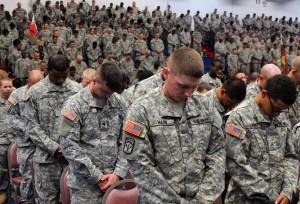 Last week the U.S. Department of Defense (DOD) approved a new policy to allow accommodation for religious expression in the military.
Last week the U.S. Department of Defense (DOD) approved a new policy to allow accommodation for religious expression in the military.
“The new policy states that military departments will accommodate religious requests of service members, unless a request would have an adverse effect on military readiness, mission accomplishment, unit cohesion,” U.S. Navy Lt. Cmdr. Nathan Christensen, a Pentagon spokesman, said.
The policy was mainly expected to affect Sikhs, Muslims, Jews, and members of other groups that wear beards or articles of clothing as part of their religion. Accommodation will have to be requested with each change in assignment and will be determined by the new unit’s commander to assure that physical appearances “do not interfere with good order and discipline.”
Many are cautiously optimistic that the DOD’s new directive will protect service members’ freedom to practice and express their faith.
Lt. Gen. (ret.) Jerry Boykin, executive vice-president of the Family Research Council, said,
“The Defense Department’s new regulations concerning religious expression in the military are an important step forward in the effort to strengthen religious liberty protections in the military.
“The key thing will be implementation: Does the Pentagon understand that religious liberty is our core freedom and that curtailing its expression in the military is not only unconstitutional but also deeply harmful to morale and unit cohesion? . . . we have to ask if commanders at home and abroad will be encouraged to apply the new rules effectively and consistently, such that service personnel will be at liberty to express their most deeply held convictions without fear of reprisal.”
Family Research Council will be watching closely to see how our military puts the DOD Instruction into practice.
Cmdr. John B. Wells (USN-Ret.), executive director of Military-Veterans Advocacy, says the directive incorporates provisions of the Religious Freedom Restoration Act, which currently applies to most federal laws and policies. Extending these protections will rightly benefit all faiths, he believes, including traditional Judeo-Christian beliefs. He says the news rules prohibit retaliation against expression of sincerely-held beliefs. “In some cases, we’ve had military personnel – including chaplains – threatened with discipline if they continue to express their beliefs according to the tenets of their faith. This directive will make that illegal.”
The new directive makes the policy retroactive to 2009, which impacts religious freedom cases that currently may be making their through the courts.
The Liberty Institute adds that for the first time DOD will accommodate the religious speech and practices of service members, unless DOD can prove why it cannot accommodate the religious speech or practice, placing the burden on DOD instead of the individual service member.


